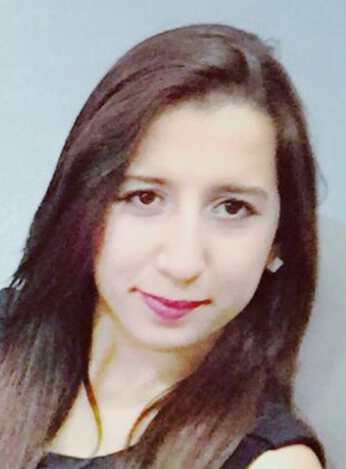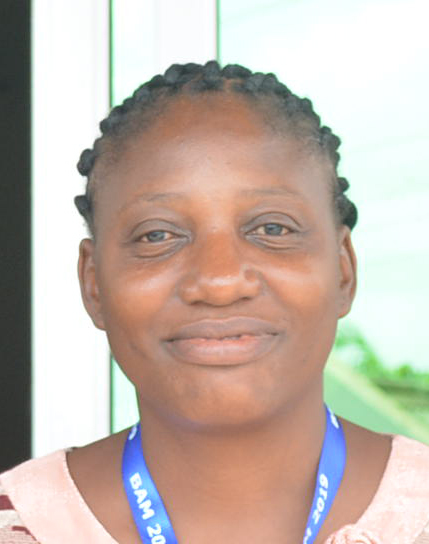![The 4th TYAN International Thematic Workshop and 1st African Symposium on Big Data, Analytics and Machine Intelligence for Financial, Health and Environmental Inclusion in Developing Countries took place 10-14 June in Akure, Nigeria. [Photo provided]](/sites/default/files/inline-images/nigeria_group.jpg)
Moroccan researcher Chadia Ed-driouch studies gene selection and drug design. But knowledge about the machine learning and big data techniques important for bioinformatics – a field that combines biology, computer science, and mathematics – is not easily available in her home country. There are only two master's programmes in the field, she said, so data researchers often rely on the Internet for the education they need.
 This makes it difficult to both learn reliable information or make connections with other Africans in the field. “I want to contribute to the development of scientific research at each level in my country,” said Ed-driouch. “I would like to broaden my horizons, and I wanted the chance to meet various groups to share information and to develop my skills so that we could perhaps work together in lab projects in the future.”
This makes it difficult to both learn reliable information or make connections with other Africans in the field. “I want to contribute to the development of scientific research at each level in my country,” said Ed-driouch. “I would like to broaden my horizons, and I wanted the chance to meet various groups to share information and to develop my skills so that we could perhaps work together in lab projects in the future.”
A recent event held in Akure, Nigeria, provided her with an uncommon but important source of education in this fast-growing, cutting-edge field.
The event was organised by TWAS and the TWAS Young Affiliates Network (TYAN), with support from the Elsevier Foundation. It included a symposium with talks by several international experts, and finished with a workshop in which African researchers received hands-on training in big data and machine learning techniques.
The event was created to help Africa adapt and take advantage of an important shift in science: Big data and intelligence techniques, such as machine learning, are enabling scientists to turn enormous amounts of data into discoveries that have thus far been out-of-reach.
The 4th TYAN International Thematic Workshop and 1st African Symposium on Big Data, Analytics and Machine Intelligence for Financial, Health and Environmental Inclusion in Developing Countries took place 10-14 June in Akure, Nigeria. It brought these powerful tools to a new generation of African scientists. Taking part were over 70 researchers from 14 different countries – eight of them African. The Elsevier Foundation is a long-time TWAS partner dedicated to diversity and inclusion in science, technology and health, as well as advancing research in developing countries.
 Event organizer Bolanle Ojokoh, a data scientist who serves on the TYAN Executive Committee, said that with more data comes more complexity, so it’s difficult to get more meaningful information from the data unless scientists have the right tools. Information from mobile devices, she said, is especially important because that’s where so much of the new data is coming from.
Event organizer Bolanle Ojokoh, a data scientist who serves on the TYAN Executive Committee, said that with more data comes more complexity, so it’s difficult to get more meaningful information from the data unless scientists have the right tools. Information from mobile devices, she said, is especially important because that’s where so much of the new data is coming from.
She said the concept for the workshop was conceived by TYAN at its executive meeting in Turkey in April 2018. Network leaders felt that the area of big data was critical to advancements in the developing world – and especially in Africa.
“The idea behind this event is to gather young scientists together and help them to increase their knowledge and amass their strength,” Ojokoh said. “This will help the developing world by providing a means to use this big data and find meaningful patterns (in the data) to solve some problems.”
Better crops, better medical care
![Ross King speaks at the event about artificial intelligence. [Photo provided]](/sites/default/files/inline-images/ross_king_lecture_web.jpg) Ross D. King, an expert in machine learning from the University of Manchester, U.K., was a keynote speaker at the event. Machine learning is the branch of artificial intelligence that develops systems that learn from experience, and it’s the core technology of Google, Amazon, Facebook and other global tech companies. That, said King, arguably makes it the hottest technology on the planet.
Ross D. King, an expert in machine learning from the University of Manchester, U.K., was a keynote speaker at the event. Machine learning is the branch of artificial intelligence that develops systems that learn from experience, and it’s the core technology of Google, Amazon, Facebook and other global tech companies. That, said King, arguably makes it the hottest technology on the planet.
“It’s very generic technology, so you can apply it to many different types of fields,” he said. “From advertising to crops, it’s basically the same technology. “You could see its role in designing better drugs for Africa, or for better crops.”
For example, King said he uses machine learning in his work with the International Rice Research Institute in the Philippines to develop better crops that can grow in less nutrient-rich soils or survive droughts. The technology can also help monitor crop health, improve the selection of crops by farmers, and even provide farmers with information on where to sell their crops for the best prices. The process can help Africans as easily as anyone, so long as Africans are participating in this kind of research.
“Hopefully they learned a bit about machine learning, the state of the art," King said. "They were very enthusiastic about learning, and grateful for people from outside to come and visit, and see how things work in Africa and help them.”
Another area where machine learning is valuable is surgical robotics, said Olatunji Mumini Omisore, a workshop attendee and a Nigerian working at the Shenzhen Institutes of Advanced Technology, part of the Chinese Academy of Sciences.
![Olatunji Mumini Omisore speaks during the event. [Photo provided]](/sites/default/files/inline-images/olantunji_omisore_web.jpg) The highly precise movements of today's flexible robotic systems are governed by advanced mathematical models, Omisore said, but those models can be time consuming and hard to come by in Africa. By using machine intelligence, they can not only get stronger models for robotic models, but also create programmes to maneuver robotic tools that aren’t reliant on models.
The highly precise movements of today's flexible robotic systems are governed by advanced mathematical models, Omisore said, but those models can be time consuming and hard to come by in Africa. By using machine intelligence, they can not only get stronger models for robotic models, but also create programmes to maneuver robotic tools that aren’t reliant on models.
“In almost every field there is an abundance of data, and when there’s an abundance of data, you can find regular patterns to extract,” said Omisore. “In robotics, it’s about motion control. We can work on flexible surgical robots with distinct joints and unique rotational axes. So we are always developing motion control models that can be used to coordinate or control the robot’s movements.”
Omisore said that one useful thing he learned at the workshop was how to define deep network models – computing systems modelled after animal brains. “I have strongly felt in the last two years one of the best ways of solving control problems in robotics is machine intelligence,” he said, “so that we can define new architecture and solutions.”
Sean Treacy

